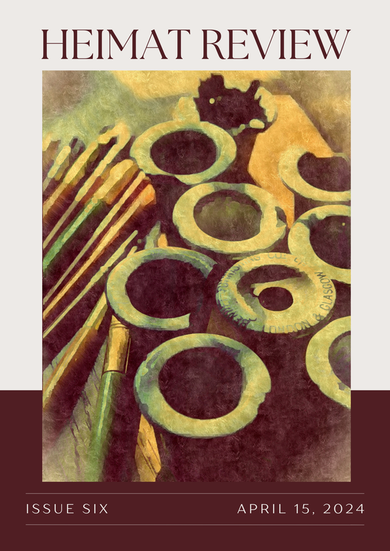The King of Grief
By Jen Colclough
April 15, 2024
April 15, 2024
|
|
I have no interest in leaving a mark on the world.
The world has given me plenty and has earned little gratitude for its effort. Still, this ship has been leaking for years with unpaid debts, loose eyelashes, and hand-made mugs which had seemed a good idea at the time. And yet. They’ll say I was a Renaissance Man, except for that last part. The smart-looking lawyer with the leather folder will arrive at 9 o’clock to tell you precisely what knowing me was worth. You see, death is difficult to schedule but the After Part is all industry. A redistribution of matter. If the universe made any sense, King Solomon would have had it right. Citing this, the lawyer in her thick frames and pointed chin would take the pearl necklace into her hands, sever the bonds, and give a pearl to each of you. And each beloved friend would take the pearl in the palm of their hand and remember the ocean. ‘My,’ they would remark, ‘I remember this pearl when it belonged to the clam and I remember this pearl in the bucket on the ship and on the jeweller’s workbench and dangling from her neck like a raindrop on the window.’ But this is impossible. You dear ones only knew the necklace and besides, the lawyer would never. She knows it is neither fair nor practical to be left with a fragment of the whole. And yet. And yet. |
|
Jen Colclough is a poet, novelist, and ESL Instructor from Nova Scotia, Canada. She holds a Master of Arts in Classics from Western, as well as a Bachelor of Arts with Honours from Acadia University. Her poems have been featured in several journals and anthologies, including: Ionosphere, MORIA Literary Magazine, OpenDoor Magazine, Tidewise Illustrated Quarterly, and Free the Verse. Her short story, “The Opposite of Hunger,” was published in The Petal Pages, an anthology of LGBTQ prose and poetry. Finally, her academic article "Memorialization in Thucydides’ Plague Episode," appeared in Vol. 11 Iss. 1 of the Journal of Ancient History in May 2023.
|
Author's Note:
When I wrote “The King of Grief,” I was halfway through an Artist’s Residency at Beinn Mhàbu in Cape Breton, Nova Scotia. While there, I attended an online poetry workshop hosted by Poet Cara Morgan that centred around themes of legacy and enduring memory. I’ve always thought of the curation of memory as being similar to the creative placement of furniture. Making sense of the past means doing your best to organize your memories into a neat arrangement suitable for your needs. We reshape and we narrativize, and in the end, our memory of the experience becomes our experience.
Similarly, when it comes to legacy, the dead have no control over how you will organize what’s left of them once they pass on. They’re no longer in the story— it’s all you. The pearl metaphor came easily, as I’ve been called “Lisa Simpson,” in the past for how often I wear them. The idea of dividing the strand into fragments is both fair and unreasonable. You cannot receive a portion of the whole and still be satisfied because two functions have been removed through this process: the pearls can no longer be worn, and the person who wore them will never do so again. The remembered journey of the pearls from the sea to their owner is another point of contrast with the deceased. The “dear ones,” are those who have witnessed the speaker’s evolution. Although they may remember the origins of the journey, conclusions have a way of eclipsing origins, particularly when it comes to grief.
My favourite lines from this poem would have to be: They’ll say I was a Renaissance Man, / except for that last part. I’ve always found it interesting that a man with diverse interests is credited with this moniker, while no such equivalent exists for women. “She spread herself too thin,” or “she had a finger in every pie,” come to mind, but they fail to match the dignity of a “Renaissance man.”
Similarly, when it comes to legacy, the dead have no control over how you will organize what’s left of them once they pass on. They’re no longer in the story— it’s all you. The pearl metaphor came easily, as I’ve been called “Lisa Simpson,” in the past for how often I wear them. The idea of dividing the strand into fragments is both fair and unreasonable. You cannot receive a portion of the whole and still be satisfied because two functions have been removed through this process: the pearls can no longer be worn, and the person who wore them will never do so again. The remembered journey of the pearls from the sea to their owner is another point of contrast with the deceased. The “dear ones,” are those who have witnessed the speaker’s evolution. Although they may remember the origins of the journey, conclusions have a way of eclipsing origins, particularly when it comes to grief.
My favourite lines from this poem would have to be: They’ll say I was a Renaissance Man, / except for that last part. I’ve always found it interesting that a man with diverse interests is credited with this moniker, while no such equivalent exists for women. “She spread herself too thin,” or “she had a finger in every pie,” come to mind, but they fail to match the dignity of a “Renaissance man.”


